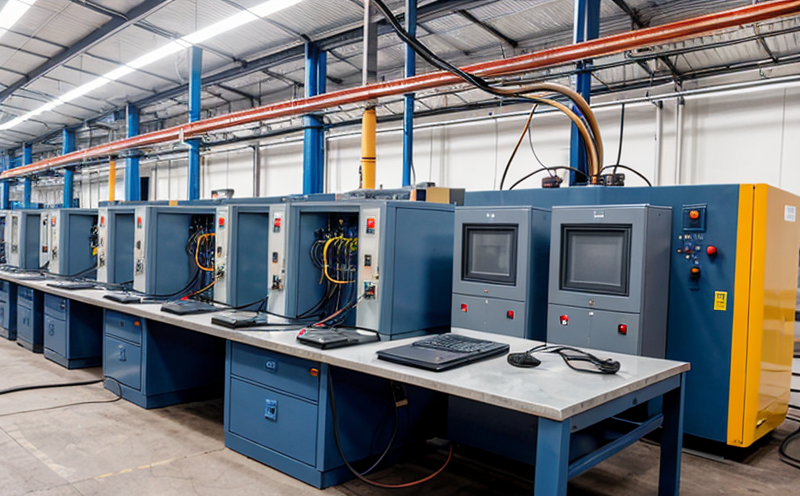IEC 61892 Electrical Installations in Processing Facilities Testing
The IEC (International Electrotechnical Commission) standard 61892 is specifically designed for the testing and certification of electrical installations within processing facilities. This standard ensures that all electrical systems comply with stringent safety, efficiency, and reliability requirements pertinent to industrial manufacturing processes.
IEC 61892 covers a comprehensive range of tests and inspections aimed at verifying the integrity, performance, and compliance of electrical installations in environments where hazardous materials are handled or processed. These facilities include petrochemical plants, refineries, food processing units, pharmaceutical factories, and any other industries dealing with flammable substances.
The standard emphasizes the importance of preventing accidents caused by electrical faults that could lead to explosions, fires, or environmental pollution. It mandates thorough inspections of all electrical components such as motors, transformers, switchgear, lighting systems, and control panels. The tests ensure that these installations are not only safe but also optimized for energy efficiency.
Compliance with IEC 61892 is crucial for businesses operating in highly regulated sectors to avoid legal penalties and reputational damage. It also helps companies meet insurance requirements by demonstrating due diligence in maintaining safe working conditions. The detailed testing protocols outlined in this standard provide a robust framework for identifying potential hazards before they can cause significant disruptions.
Testing according to IEC 61892 involves several key procedures including visual inspections, insulation resistance measurements, earth continuity checks, and load tests. These tests are conducted using specialized equipment tailored to detect even the slightest anomalies in the electrical systems. The results of these assessments form part of a comprehensive report that serves as evidence of compliance.
For industries relying heavily on reliable power supply, such as pharmaceuticals or food processing, ensuring adherence to IEC 61892 is essential for maintaining production schedules and product quality. By implementing this standard rigorously, companies can enhance operational efficiency while minimizing the risk of costly downtime due to electrical failures.
- Visual Inspections: Thorough examination of all electrical components to identify visible signs of wear or damage.
- Insulation Resistance Measurements: Assessing the quality of insulation between live parts and earth, ensuring it meets specified thresholds.
- Earth Continuity Checks: Verifying the integrity of the earthing system by measuring resistance between various points in the installation.
- Load Tests: Subjecting electrical installations to real-world load conditions to evaluate their performance under stress.
Why It Matters
Compliance with IEC 61892 is not just a regulatory requirement; it represents a commitment to safety, efficiency, and environmental responsibility. In processing facilities where hazardous materials are present, the risk of electrical faults leading to explosions or fires is real and potentially catastrophic.
The standard ensures that all electrical installations meet international best practices, thereby reducing the likelihood of such incidents occurring. By adhering to these stringent guidelines, businesses can protect their employees, customers, and surrounding communities from unnecessary risks.
Moreover, compliance with IEC 61892 helps companies achieve greater operational reliability by identifying potential issues early on through rigorous testing. This proactive approach ensures that electrical systems are always functioning optimally, which is crucial for maintaining consistent production rates and high-quality outputs.
The standard also plays a vital role in enhancing the environmental footprint of processing facilities by promoting energy-efficient practices. By minimizing unnecessary power consumption, companies can reduce their carbon emissions and contribute positively to sustainability goals.
Industry Applications
- Petrochemical Plants: Ensuring safe handling of flammable materials through robust electrical systems.
- Refineries: Maintaining reliable power supply to support complex refining processes without interruptions.
- Food Processing Units: Guaranteeing consistent quality and safety in food production by adhering to strict electrical standards.
- Pharmaceutical Factories: Protecting sensitive manufacturing equipment from electrical faults that could compromise product integrity.
Why Choose This Test
Comprehensive Compliance Verification: Ensures full adherence to international standards, thereby avoiding legal and regulatory issues.
Enhanced Safety Measures: Identifies potential hazards early, preventing accidents and ensuring a safer working environment.
Operational Reliability: Through rigorous testing, maintains consistent performance of electrical installations, minimizing downtime and disruptions.
Environmental Responsibility: Encourages energy-efficient practices leading to reduced carbon footprint and sustainable operations.





